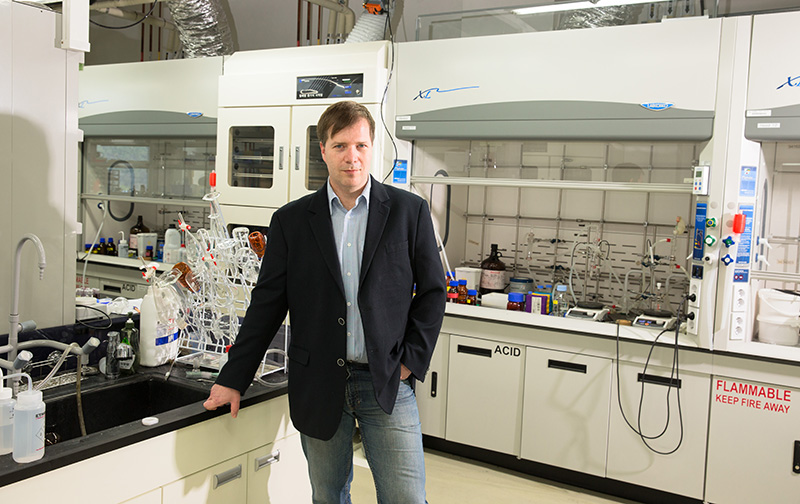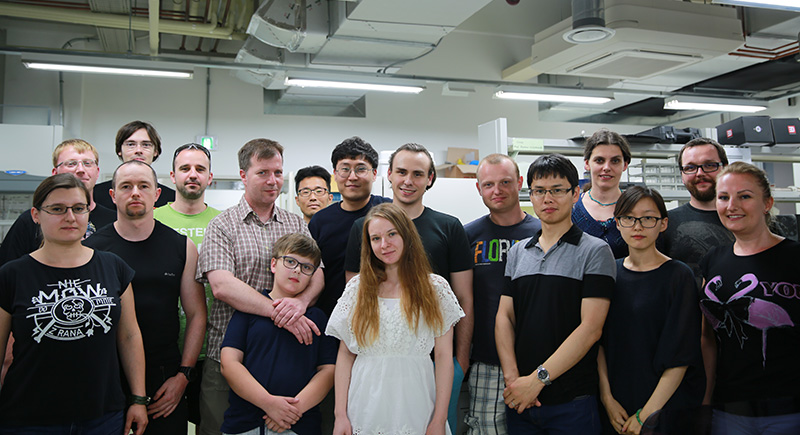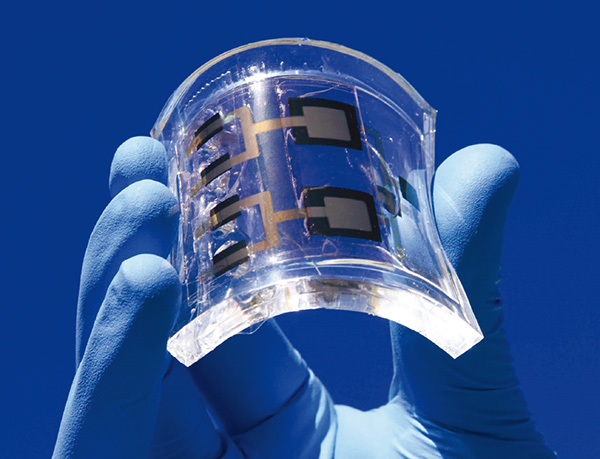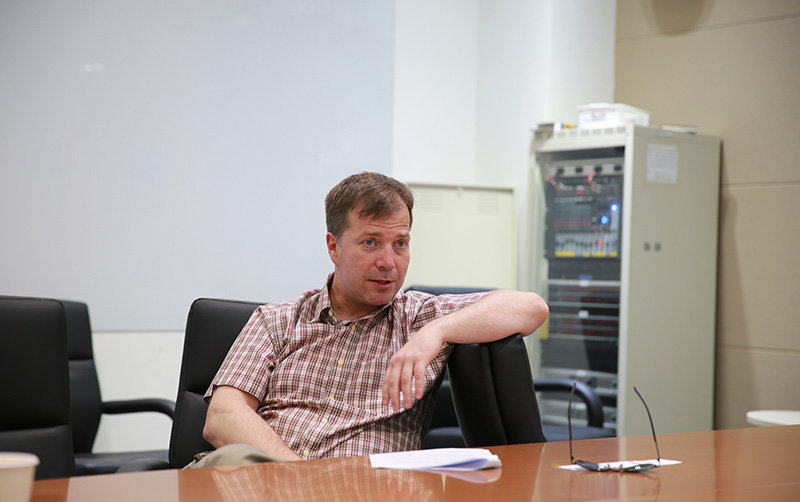- Know where things are going, and then you will see the next big thing
- Name관리자| Date2016-09-20 16:15| Hit4,035
- Attachments bartosz.jpg (157.6K, 880회)
-
Know where things are going, and then you will see the next big thing
- Group Leader Bartosz Grzybowski of the IBS Center for Soft and Living Matter -
Since the AI program AlphaGo defeated the world-class Go player Lee Sedol, people are wondering what will come next for AI. While AI is generating lots of buzz about its potential value, Bartosz Grzybowski's 'Chematica', a computer software for planning synthetic routes, is becoming of great interest in the chemistry world, triggering a question, "Will AI replace even scientists in the future?"
In an interview with IBS Newsletter, Group Leader Bartosz Grzybowski of the IBS Center for Soft and Living Matter explains the complimentary relationship between 'Chematica' and chemists, his recent research projects, and his philosophy of research and life.

▲ "Chematica is here to stay as a useful tool for chemists to get their job done, rather than take it away," Grzybowski explains. Chematica is Grzybowski's 15 years of work and it culminates with his recent paper in Angewandte Chemie.Chemtatica, here to stay as a collaborator for chemists
Grzybowski explains "Chematica is here to stay as a useful tool for chemists to get their job done, rather than take it away." Chematica is Grzybowski's 15 years of work and it culminates with his recent paper in Angewandte Chemie, proving that this deep-learning computer program is becoming relevant and helpful to the practice of organic synthetic planning.
For over the past 50 years, many programs were created to teach computers how to plan organic syntheses, but it has until recently remained as one of the holy grails of organic chemistry. Now Chematica, dubbed as an internet for chemistry, networks and learns from nearly 250 years of chemical knowledge and allows us to explore all the possible chemical synthesis and find the most efficient target synthesis. As Chematica amasses all the knowledge, which may otherwise disappear with a retirement of a trained chemist, Grzybowski describe this giant network of organic chemistry as an "immortal scientist".
A guide to the shortcut of an optimal synthetic route
Simply put, Chematica – similar to a GPS navigation as described by Derek Lowe, a medicinal chemists and blogger in his blog, "In the Pipeline" – tells you how to reach your destination (synthesize a desired compound) in an efficient way by finding a shortest route (synthetic steps). In retrosynthetic planning, there are many choices to make until target synthesis as you need to purify intermediates at each step to proceed to the next process. Chematica's algorithms are trained to combine multistep reactions into one-pot synthesis in seconds. This represents huge savings for the chemical industry, as well as relieves the burden of the time and effort required by chemists to complete the synthetic process.
In his 2012 paper, Grzybowski reported Chematica's algorithms to optimize the synthesis of existing compounds and predict what compounds can be made based on precedents. Marking the finale of the 15 years of work, the latest 2016 paper has verified that Chematia can finally work on any kind of chemicals – be it known or unknown. It states that Chematica can be taught to plan a completely new and fully automated design of syntheses leading to relatively complex targets. Grzybowski says "Back in 2012 Chematica could not predict the entire process. This upgraded algorithm now allows us to predict a full set of chemical synthesis from A to Z." Notably, compared to relatively simple targets from the early synthetic-chemical programs, this complete set is also pushing its limits by targeting a non-trivial synthesis.

▲ Grzybowski's lab has a diverse portfolio of 20 research projects, ranging from new materials to cancer biology. Being open to any type of question, the research topics of his lab are quite interdisciplinary and also, as Grzybowski describes it, "just fundamentally for fun."Keep learning to get even better
"The great thing about Chematica is that it not only contains a vast amount of knowledge, but also reinvents itself by constantly learning from experts' teachings," Grzybowski explains. "Some people say that chemical synthesis is so complicated like art that machines will never cut it. However, our study proves that is not always the case and assures that Chematica will get even better."

▲ Flexible, water-loving logic circuits and sensors without semiconductorsGrzybowski hopes "Every chemist planning synthesis uses Chematica as a chemical calculator." Speaking of the popular fear of AI replacing humans he says "I am not worried, I rather believe that Chematica will be a great help for chemists, as it allows them to focus their knowledge and creativity on harder questions by making the synthetic process shorter and way more economical."
Grzybowski's lab has a diverse portfolio of 20 research projects, ranging from new materials to cancer biology. As shown from such various research topics, Grzybowski is quite exceptional in identifying a seemingly small, but possibly impactful difference and developing it into his research theme.
Flexible, water-loving logic circuits and sensors without semiconductors
In his Nature Nanotechnology paper published in March of 2016, Grzybowski's research team developed a way to fabricate flexible, water-loving logic circuits and sensors without the need of semiconductors. Grzybowski says, "Though there was a growing need for diversifying the applications of electronic transistors, everyone was stuck with the conventional idea, say electronics needs semiconductors. I wanted to show it is not always the case." Marking a quite rapid departure from the old approach, he coated gold nanoparticles with charged organic molecules to sense and process chemical signals. This novel circuit looks to be a promising solution for logic circuits used in wet environments, as well as for sensors in artificial skin that demands flexibility.
The first rational design of antibiotics, foiling any attempts to develop resistance
Grzybowski's novel perspective also shines in another paper from May of 2016 published in Angewandte Chemie. The research focuses on a long known but largely overlooked property of bacteria: The difference in surface changes of bacteria. His research team developed nanoparticles which selectively kill the bacteria by electrostatic interactions. Grzybowski explains, "There were no single antibiotics that allow us to design their target as we like, whether it be Gram positive or Gram negative bugs. This study is the first rational design of Gram-selective antibiotics, which are quite potent since bacteria cannot develop resistance towards nanoparticles."

▲ "I rather enjoy being a scientist in a number of disciplines. You learn all the time, which is what makes science fun. It gets even better when you discover a problem and see it solved, the harder the problem, the greater the feeling of having solved it."Going to Sci Foo 2016
Grzybowski has been recently invited to the 2016 Science Foo Camp (SciFoo) taking place at Googleplex in California, USA from 22-24 July 2016. As an invitation-only, un-conference organized by Google, O'Reilly Media, and Digital Science, with support from Nature, SciFoo invites 250 people specifically selected from around the world for their groundbreaking work in diverse areas of science and technology.
Grzybowski is looking forward to attending the SciFoo as, he thinks, it is the perfect place where he can meet people he would not normally encounter. "In a sense SciFoo is the place where the future of science is decided. My strategy for the event? I want to see leaders and know what they are planning for the future." Grzybowski thinks scientists especially need to know what is going to happen around the world in order to identify research themes of great relevance to the lives of people. He believes getting a little better from the existing knowledge does not cut for the next big thing. "Know where things are going and then you will see the next big thing," Grzybowski says.
"Science is fun, but hard work. You need to prepare for it." Grzybowski says his lab does not have any predefined research themes as they go by how intriguing a problem is. Being open to any type of question, the research topics of his lab are quite interdisciplinary and also, as Grzybowski describes it, "just fundamentally for fun." Rather than being exhausted, Grzybowski says, "I rather enjoy being a scientist in a number of disciplines. You learn all the time, which is what makes science fun. It gets even better when you discover a problem and see it solved, the harder the problem, the greater the feeling of having solved it."
로케이션영역
- What's New
- News

